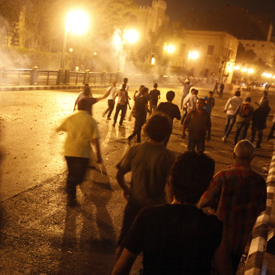Violence returns to Egypt’s Tahrir Square
Police fire tear gas at demonstrators in Cairo’s central Tahrir Square, leaving more than 1,000 injured, amid demands that trials of former senior officials proceed more swiftly.
The clashes broke out on Tuesday after relatives of the more than 840 people killed in the uprising at the start of 2011 gathered to honour them.
Demonstrators were angry at what they say is the slow prosecution of senior officers responsible for the deaths.
It was the first violence in weeks in Tahrir Square, the focus of the protests that led to Hosni Mubarak being toppled earlier this year.

Police in riot gear used shields to block protesters from marching towards the ministry. One police motorbike near the square spewed black smoke after being set alight.
“The people are angry that the court cases against top officials keep getting delayed,” said Ahmed Abdel Hamid, 26, a bakery employee at the scene who clutched stones in his hand.
He said police clashed with some of those gathered at the event to honour the “martyrs”, prompting protesters to move to Tahrir Square.
“The people want the fall of the regime,” some chanted. Others called for Field Marshal Mohamed Hussein Tantawi, head of the military council now ruling Egypt, to step down.
The ministry said in a statement that a group of people had been stopped from joining an event at a theatre to honour the “martyrs” and had tried to barge their way in.
The people are angry that the court cases against top officials keep getting delayed. Tahrir Square protester
In a statement on its Facebook page, the ruling military council said that the events “had no justification other than to shake Egypt’s safety and security in an organised plan that exploits the blood of the revolution’s martyrs and to sow division between the people and the security apparatus.”
Political activists who have helped organise other recent protests in Tahrir said the scenes on Tuesday evening and early Wednesday were not part of any planned protest.
Egypt’s former interior minister, Habib al-Adli, has been sentenced to jail for corruption but he and other officials are still being tried on charges related to killing protesters.
The former president Hosni Mubarak, now hospitalised, has also been charged with killing protesters and could face the death penalty. His trial begins on 3 August.




